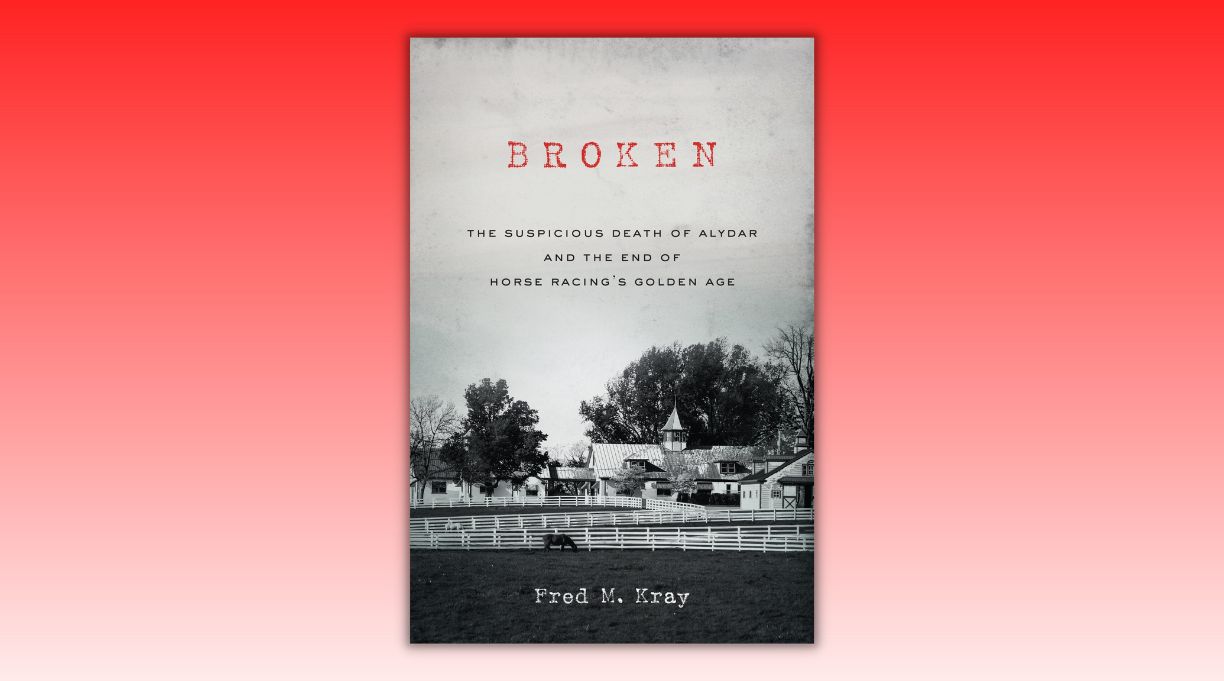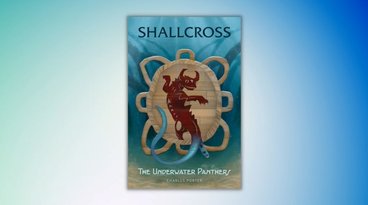When Alydar died in 1990, he was one of the most famous horses bred and owned by Calumet Farm in Lexington, Kentucky. His rivalry with Triple Crown–winner Affirmed was legendary, and after his retirement in 1984, Alydar was one of the most sought-after studs in thoroughbred history. He was known for his fighting spirit and imperious manner, but also for his gentle way with people.
At the time of Alydar’s death, the horse-racing world accepted the explanation that Alydar was euthanized after kicking his stall door hard enough to shatter his leg. Years later, new evidence would complicate that story. The precise cause of Alydar’s death remains a mystery, one Fred Kray, author of Broken: The Suspicious Death of Alydar and the End of Horse Racing’s Golden Age, is hoping to solve.
Kray saw Alydar race for the first time in 1978, when he took a day off work to watch the Flamingo Stakes at Hialeah Park Race Track about a half hour’s drive from Miami. Kray had gotten interested in horse racing while working at a track in Lincoln, Nebraska, during law school, but Hialeah was a totally different experience. “What we’d say about the horses in Nebraska was, ‘They plow the fields in the afternoon, and they race in the evening.’ ”
At Hialeah, Kray was seeing the sport’s elite athletes, and none of these champions captured his attention quite like the powerful chestnut stallion wearing the number One:
Alydar refused to load into the starting gate and had to be pushed in by three assistants. The gate slammed shut. The starting bell clanged. The announcer shouted, “And they’re off.” Alydar stayed in the back of the pack as Believe It took the lead at the three-eighths pole. Down the stretch, Alydar exploded, running past Believe It as if he were standing still. I felt the grandstand vibrate as the horse hooves hammered down the stretch and Alydar breezed to a four-and-a-half-length win. The power, the determination, the dominance. I fell in love with Alydar that day, feeling a deep connection with the horse that was impossible to explain.
A chance encounter with someone who was at Calumet Farm the night Calumet died inspired Kray to write Broken, a book Kirkus Reviews describes as a “poignant and thorough look at a real-life horse-racing mystery” in a starred review. We caught up with the author at his home, where he and his wife were in the midst of packing for a move from Miami to Memphis, Tennessee.
Kray was at a turning point in his life that day at Hialeah. He had just started his job as a trial lawyer, and he was miserable. “I was thinking, I can’t do this job. It’s too hard. It’s overwhelming. Just two weeks after the bar exam, a guy hands me a file and says, ‘Trial’s on Monday.’ No mentorship, no training, nothing. So when I saw Alydar in the Flamingo Stakes, I was thinking about quitting my job and wondering what else I could do. But while I was watching him run, I saw his determination coming down the stretch, and I saw him succeed. It was a teaching moment for me. I told myself, You’ve got to keep going. You’ve gone to law school. You’ve sacrificed seven years of your life. You can’t quit. You’ve got to keep going.”
And Kray did keep going, although on that day back in 1978, he could not have imagined that he would ultimately find his calling in animal law. This turning point came about when he went to court to fight a ticket for not having a dog license. He won his case by pointing out that the dog in question no longer needed a license, as the dog had died. But this experience got him thinking about people who might not find it so easy to defend themselves against unfair charges.
Kray will go to great lengths to find justice for his clients. He tells a story about saving a pit bull that includes DNA testing, a photo array, and a detailed explanation about why “pit bull” isn’t an actual breed of dog or even a well-defined term—a fact that complicates ordinances against keeping the dogs as pets. He has been an activist on behalf of animals. He’s taught animal law. And in 2016, he received the Animal Lawyer of the Year Award from the American Bar Association.
While his professional background makes him particularly well suited to examine the evidence around Alydar’s death, it’s his love of animals and the people who work with them that drives him. Kray says that when he was a boy growing up in Brigantine, New Jersey, his Great Dane was his “main source of security.” In seeing the “backside of horse racing”—while both working at the track and researching this book—he got to know a lot of people who share a special bond with the animals they care for.
Kray offers the example of Alydar’s groom, Clyde Sparks. In his book, Kray writes, “Sparks was so attuned to Alydar that he could calm him down before anyone even realized the horse was upset. If Alydar did get upset, Sparks was able to talk him down. He was an excellent horseman, and it was Sparks’s calming influence on Alydar that perhaps created the sense that the horse was more easygoing than he actually was.” In conversation, Kray relates that Sparks was estranged from his family—so much so that he chose to sleep at the track rather than stay with family when Alydar raced at Belmont Park. “With horses—with dogs, with other animals—there’s an unconditional love that many people crave. It’s really what they need to survive because of whatever scarring they’ve had in their personal relationships. It’s a quiet, undramatic kind of love.”
Kray’s interest in the human element of Alydar’s story shines through in the interviews he conducted with people in the horse’s orbit. A skilled interviewer, he shares, “I love meeting people. I love asking them questions. I love asking them questions that they don’t necessarily want to answer.”
Excerpts from some of these interviews are included in the podcast that serves as an audio companion to the book. Kray’s daughter is an award-winning producer, and the podcast is absolutely riveting. There’s also a website where Kray lays out all the evidence and asks readers to cast their verdict on Alydar’s death: “Was it an accident? Or was it murder?” The lawyer in Kray is intrigued by the mystery, but still, when he talks about Alydar, he always comes back to his own profound connection with this horse and the people whose lives Alydar touched.
Toward the end of our conversation, Kray mentions John Veitch. Born in Kentucky to a family that had been training horses for three generations, he was Alydar’s trainer during the horse’s runs for the Triple Crown. Veitch, Kray says, “loved Alydar more than anybody.” Kray sent Veitch a copy of Broken just before the horse-racing legend died. Kray has gotten a lot of praise for his book, but nothing compares to Veitch’s one-sentence review: “You got everything right.”
Jessica Jernigan is a writer who lives and works on Anishinaabe land in Central Michigan.









































